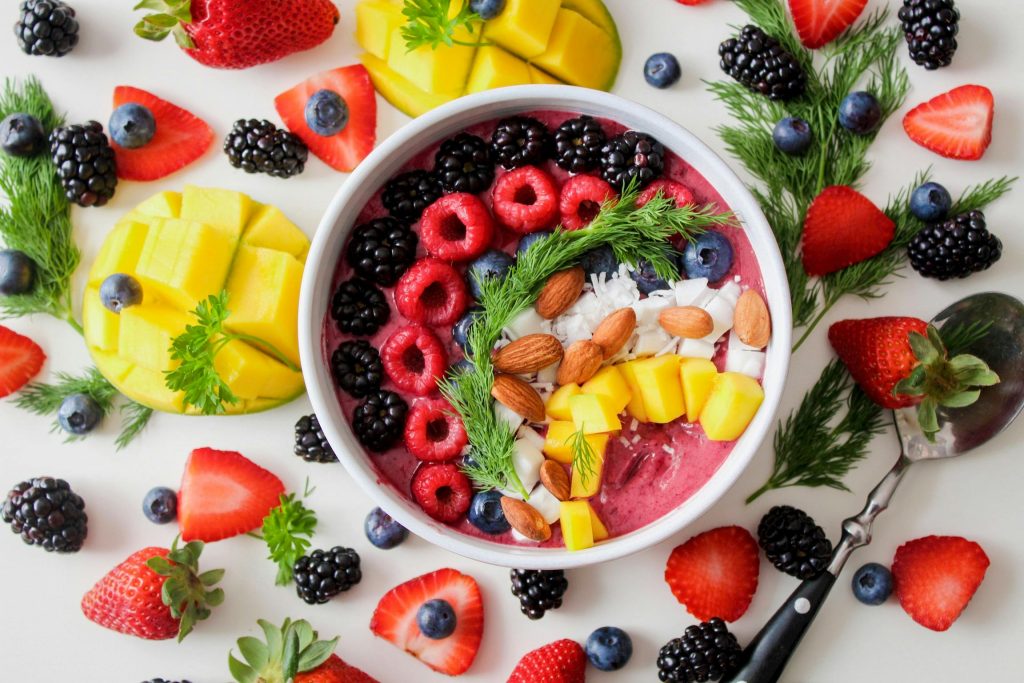Embarking on a weight loss journey doesn’t mean sacrificing flavor. In fact, there are numerous foods that not only taste delicious but also support your weight loss goals. These nutrient-packed powerhouses can be easily incorporated into your daily diet, making the journey to a healthier you both enjoyable and satisfying!
Avocado
Avocado, often referred to as the “butter of the plant kingdom,” is not just a delicious addition to your meals; it’s also a nutrient powerhouse that can significantly contribute to your weight loss goals. This creamy fruit is rich in monounsaturated fats, which are the heart-healthy fats that can help reduce bad cholesterol levels and provide a steady source of energy.
Healthy Fats for Satiety:
Avocados are primarily composed of monounsaturated fats, which have been associated with increased satiety and reduced overall calorie intake. Despite being calorie-dense, the fats in avocados contribute to a feeling of fullness, helping you control your appetite and avoid unnecessary snacking.
Fiber Content for Digestive Health:
A key component of avocados is dietary fiber. Fiber is crucial for maintaining a healthy digestive system and promoting regular bowel movements. The fiber in avocados also slows down digestion, preventing rapid spikes and crashes in blood sugar levels. This steadiness in blood sugar helps control cravings and keeps you feeling satisfied for longer.
Nutrient Density:
Avocados are not only a source of healthy fats and fiber but also pack a punch in terms of essential nutrients. They are rich in vitamins such as vitamin K, vitamin E, vitamin C, and several B vitamins. Avocados also contain essential minerals like potassium, which plays a role in regulating blood pressure and fluid balance.
Versatility in Culinary Applications:
One of the reasons avocados are so popular is their incredible versatility in the kitchen. Whether mashed into guacamole, sliced on toast, or blended into a creamy smoothie, avocados enhance both the flavor and nutritional content of a wide variety of dishes. The mild, buttery taste makes them a perfect complement to savory or sweet dishes, offering endless possibilities for incorporating them into your meals.
Meal Satisfaction and Weight Management:
Including avocados in your meals not only adds a delightful creaminess but also contributes to a more satisfying eating experience. This satisfaction is crucial for long-term adherence to a healthy eating plan. When meals are enjoyable and filling, you are less likely to feel deprived, making it easier to maintain a calorie deficit necessary for weight loss.
Tips on how to use Avocado for your meals:
– Spread mashed avocado on whole-grain toast for a nutritious breakfast.
– Add sliced avocados to salads, providing a creamy texture and extra nutrients.
– Blend avocados into smoothies for a rich and satisfying drink.
– Use avocado as a healthy substitute for butter or mayonnaise in various recipes.
Avocados are not only a flavorful addition to your meals but also a valuable ally in your weight loss journey. The combination of healthy fats, fiber, and nutrient density makes avocados a smart choice for those looking to improve their overall diet while achieving and maintaining a healthy weight. So, go ahead and indulge in the creamy goodness of avocados as you savor the journey to a healthier, fitter you.

Berries
Berries are not just delightful bursts of flavor; they are a nutritional superpower that can play a significant role in supporting your weight loss journey. Whether it’s the antioxidant-rich blueberries, the juicy strawberries, or the tangy raspberries, incorporating a variety of berries into your diet offers a myriad of health benefits.
Low-Calorie, High-Fiber Goodness:
Berries are naturally low in calories while being packed with dietary fiber. This combination is a winning formula for weight loss. The fiber content promotes a feeling of fullness, curbing unnecessary snacking and overeating. Additionally, the low-calorie nature of berries allows you to enjoy a satisfying portion without worrying about excessive calorie intake.
Antioxidants for Cellular Health:
Berries are renowned for their high antioxidant content, particularly from compounds such as flavonoids and polyphenols. These antioxidants help combat oxidative stress in the body, which is linked to inflammation and various chronic diseases. As you work towards weight loss, reducing inflammation is crucial for overall health and well-being.
Blood Sugar Regulation:
The fiber in berries also plays a role in regulating blood sugar levels. Unlike refined sugars that can cause rapid spikes and crashes in blood sugar, the fiber in berries slows down the absorption of sugar. This helps maintain more stable blood sugar levels, reducing cravings and providing sustained energy throughout the day.
Vitamins and Minerals:
Berries are rich sources of essential vitamins and minerals, including vitamin C, manganese, and potassium. These nutrients play vital roles in immune function, bone health, and electrolyte balance. When you’re on a weight loss journey, ensuring you get a variety of nutrients is crucial to support overall well-being.
Versatility in Culinary Applications:
One of the delightful aspects of berries is their versatility in the kitchen. They can be enjoyed fresh, added to yogurt, blended into smoothies, or tossed into salads. Their natural sweetness makes them a healthy substitute for sugary snacks and desserts, allowing you to indulge in a sweet treat without compromising your weight loss goals.
Seasonal Variety:
Berries come in a wide array of types and colors, and the availability of different berries varies by season. Embracing seasonal variety not only ensures a diverse nutrient intake but also adds excitement and novelty to your diet. Enjoy strawberries in the spring, blueberries in the summer, and raspberries in the fall, for example.
Here are some tips:
– Mix a variety of berries into your morning cereal or oatmeal.
– Blend berries into a refreshing smoothie for a nutritious snack.
– Enjoy a handful of fresh berries as a guilt-free dessert.
– Add berries to salads for a burst of color, flavor, and nutrition.
Not only are berries a delicious treat; they are nutritional treasures that can enhance your weight loss efforts. Packed with fiber, antioxidants, and an array of vitamins and minerals, berries offer a sweet and satisfying way to support your health and well-being as you work towards achieving your weight loss goals. So, savor the vibrant flavors of berries and relish in the journey to a healthier you.

Quinoa: The Ancient Grain for Modern Weight Loss
Quinoa, often hailed as a superfood, is a versatile and nutrient-dense grain that can be a valuable ally in your quest for weight loss. Originating from the Andean region of South America, quinoa has been a staple in the diets of indigenous people for centuries. Here’s why this ancient grain deserves a prominent place in your modern weight loss journey:
Complete Protein Source:
Quinoa stands out as a plant-based protein source that contains all nine essential amino acids. This makes it a complete protein, a rarity among plant foods. Protein is crucial for weight loss as it promotes satiety, helps in muscle repair, and contributes to the preservation of lean body mass during a calorie deficit.
High Fiber Content:
Fiber is a key component of quinoa that aids in weight loss. The soluble fiber content helps control blood sugar levels, preventing sudden spikes and crashes that can lead to cravings. Insoluble fiber supports digestive health by adding bulk to stool, preventing constipation, and promoting a feeling of fullness.
Rich in Nutrients:
Quinoa is a nutritional powerhouse, providing a variety of essential nutrients. It contains significant amounts of magnesium, iron, zinc, potassium, and various B-vitamins. These nutrients are vital for overall health and well-being, ensuring that your body functions optimally as you embark on your weight loss journey.
Low Glycemic Index:
The glycemic index (GI) measures how quickly a food raises blood sugar levels. Quinoa has a relatively low glycemic index, meaning it has a slower impact on blood sugar. This is beneficial for weight management as it helps maintain steady energy levels and reduces the likelihood of overeating due to blood sugar fluctuations.
Gluten-Free and Digestible:
Quinoa is naturally gluten-free, making it a suitable option for those with gluten sensitivities or celiac disease. Additionally, it contains compounds called saponins that can contribute to easier digestion. This makes quinoa a gentle choice for individuals with digestive concerns, ensuring optimal nutrient absorption.
Versatility in Cooking:
Quinoa’s versatility in the kitchen adds to its appeal. It can be used in a variety of dishes, from salads and stir-fries to soups and casseroles. The mild, nutty flavor of quinoa complements both savory and sweet recipes, providing a satisfying and nutritious base for meals.
Easy to Prepare:
Quinoa is simple to prepare, requiring only a short cooking time. Rinse the grains thoroughly, cook them in water or broth, and you’ll have a fluffy, nutritious base ready to absorb the flavors of your favorite ingredients.
Incorporating Quinoa into Your Diet:
– Replace rice or pasta with quinoa in your favorite dishes.
– Create a hearty quinoa salad with fresh vegetables and a flavorful dressing.
– Use quinoa as a stuffing for bell peppers or as a base for Buddha bowls.
– Blend quinoa into breakfast bowls or bake it into healthy snacks.
In conclusion, quinoa is more than just a trendy grain; it’s a nutritional bomb that aligns seamlessly with weight loss goals. Its unique combination of complete proteins, high fiber content, and essential nutrients makes it an excellent choice for those looking to nourish their bodies while shedding unwanted pounds. So, embrace the ancient wisdom of quinoa and make it a staple in your modern, health-conscious diet.

Greek Yogurt
Greek yogurt has recently gained widespread popularity not just for its rich, creamy texture and tangy taste but also for its impressive nutritional profile. When it comes to weight loss, Greek yogurt stands out as a versatile and satisfying option that brings a multitude of health benefits to the table.
High Protein Content:
One of the key reasons Greek yogurt is celebrated in the world of weight loss is its high protein content. Protein plays a crucial role in promoting satiety, helping you feel full and satisfied for longer periods. Additionally, the thermic effect of protein means that your body expends more energy digesting and metabolizing it, contributing to overall calorie expenditure.
Probiotics for Gut Health:
Greek yogurt is a fermented dairy product, meaning it contains live and active cultures, or probiotics. These beneficial bacteria contribute to a healthy gut microbiome, supporting digestion and nutrient absorption. A balanced and diverse gut microbiome has been linked to improved metabolism and weight management.
Calcium and Bone Health:
Greek yogurt is an excellent source of calcium, a mineral crucial for bone health. While weight loss efforts may involve a reduction in overall calorie intake, it’s essential to ensure you’re still meeting your nutritional needs. Including Greek yogurt in your diet helps maintain strong bones and supports overall well-being.
Lower in Sugar, Higher in Satiety:
Compared to many flavored yogurts, Greek yogurt tends to be lower in added sugars. Opting for plain, unsweetened Greek yogurt allows you to control the sweetness while avoiding unnecessary sugar intake. The lower sugar content, combined with the protein and fat content, enhances the feeling of fullness, preventing excessive snacking.
Versatility in Culinary Applications:
Greek yogurt’s thick and creamy consistency makes it a versatile ingredient in both sweet and savory dishes. It can be enjoyed on its own, mixed with fresh fruit, or incorporated into a variety of recipes. Use it as a base for smoothies, a topping for pancakes, or a substitute for sour cream in dips and dressings.
Regulating Blood Sugar Levels:
The combination of protein and healthy fats in Greek yogurt contributes to better blood sugar control. This can be especially beneficial for those aiming to manage their weight, as stable blood sugar levels help prevent energy crashes and reduce cravings for high-calorie, sugary snacks.
Choosing the Right Type:
When selecting Greek yogurt for weight loss, opt for varieties without added sugars and minimal additives. Consider full-fat Greek yogurt for added satiety, as the fat content contributes to a sense of fullness and satisfaction.
How to bring Greek Yogurt into Your Diet:
– Enjoy Greek yogurt with a drizzle of honey and a handful of fresh berries for a nutritious dessert.
– Use it as a base for salad dressings, enhancing both flavor and creaminess.
– Include Greek yogurt in your breakfast routine by adding it to smoothie bowls or mixing it with granola.
– Substitute it for sour cream in savory dishes to reduce calorie intake while maintaining a creamy texture.
Greek yogurt aligns perfectly with your weight loss goals. Its high protein content, probiotics, and versatility make it a valuable addition to a balanced and satisfying diet. So, savor the creamy goodness of Greek yogurt on the journey towards your weight loss objectives.

Salmon: A Delicious Catch for Weight Loss and Wellness
Salmon goes beyond its delectable taste to offer an array of health benefits, making it a valuable ally in the pursuit of weight loss and overall well-being.
Rich in Omega-3 Fatty Acids:
Salmon is renowned for its high omega-3 fatty acid content, particularly EPA (eicosapentaenoic acid) and DHA (docosahexaenoic acid). These essential fatty acids play a crucial role in supporting heart health, reducing inflammation, and aiding in weight management. Omega-3s have been linked to improved insulin sensitivity, making it easier for the body to regulate blood sugar levels and potentially reducing the risk of weight gain.
Protein-Packed Goodness:
Salmon is an excellent source of high-quality protein. Protein is essential for maintaining muscle mass, especially during weight loss when the body may be in a calorie deficit. Including protein-rich foods like salmon in your diet helps promote a feeling of fullness, making it easier to adhere to a reduced-calorie meal plan.
Satiety and Reduced Cravings:
The combination of omega-3 fatty acids and protein in salmon contributes to increased satiety. Feeling satisfied after a meal is crucial for weight loss success, as it helps prevent overeating and unnecessary snacking. The satiating effect of salmon may help reduce cravings for less nutritious, high-calorie foods.
Metabolic Boost with Lean Protein:
Salmon provides a lean source of protein, meaning it delivers essential amino acids without excess saturated fat. Protein has a higher thermic effect compared to fats and carbohydrates, meaning the body expends more energy digesting and metabolizing it. This can contribute to an increase in overall calorie expenditure, supporting weight loss efforts.
Nutrient Density:
In addition to omega-3s and protein, salmon is rich in various essential nutrients. It’s an excellent source of vitamin D, vitamin B12, selenium, and potassium. These nutrients play vital roles in bone health, energy metabolism, and overall cellular function, supporting your body as you work towards your weight loss goals.
Reducing Inflammation:
Chronic inflammation is associated with various health conditions, including obesity. The omega-3 fatty acids in salmon have anti-inflammatory properties, helping to reduce inflammation in the body. Managing inflammation is not only beneficial for overall health but can also support weight loss by creating a more favorable environment for fat metabolism.
Versatile Cooking Options:
Salmon’s versatility in the kitchen adds to its appeal. It can be grilled, baked, broiled, or poached, allowing for a variety of cooking methods to suit different preferences. Its mild, flavorful taste pairs well with various herbs, spices, and marinades, providing endless possibilities for creating delicious and healthy meals.
Salmon into Your Diet:
– Grill or bake salmon fillets and serve them with a side of steamed vegetables.
– Include canned salmon in salads or wraps for a quick and nutritious meal.
– Make a flavorful salmon stir-fry with a variety of colorful vegetables.
– Enjoy smoked salmon on whole-grain crackers as a satisfying snack.
Salmon is more than just a delicious seafood option; it has good nutritional value that supports weight loss and overall wellness. From its omega-3 fatty acids to its protein content and array of essential nutrients, salmon offers a multifaceted approach to health. So, dive into the goodness of salmon as you navigate the waters of a balanced and nourishing diet on your weight loss journey.

Time to bring out the plates!
Embarking on a weight loss journey doesn’t have to be a tasteless endeavor. By incorporating these five superfoods into your daily diet, you can savor delicious flavors while supporting your body’s efforts to shed unwanted pounds. Remember, achieving sustainable weight loss is not just about the foods you exclude but also about embracing nutrient-dense options that contribute to your overall well-being. Enjoy the journey to a healthier you with these tasty and weight-friendly superfoods! Bon Appétit 🥣 😋


